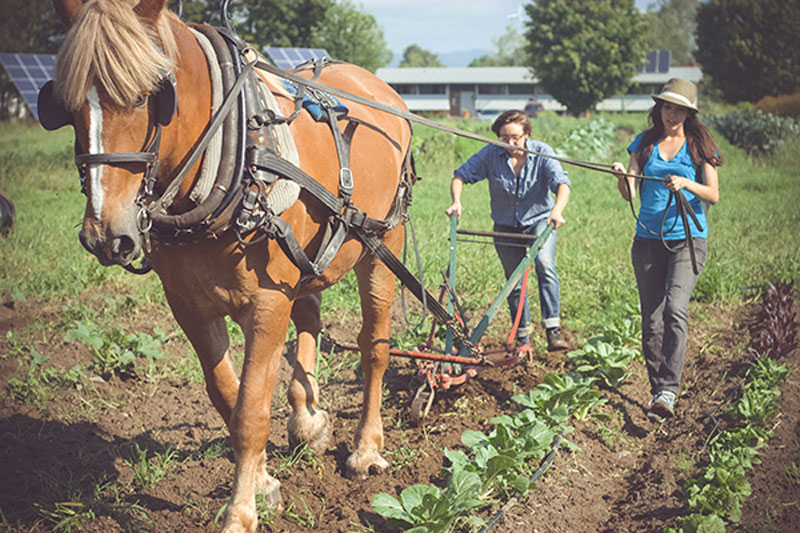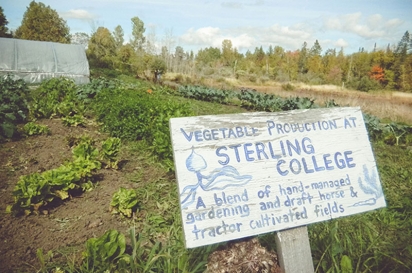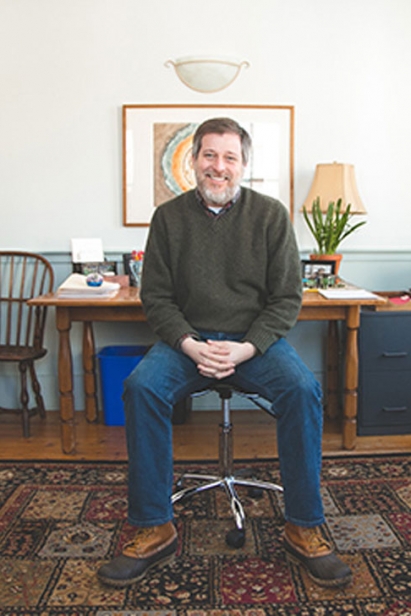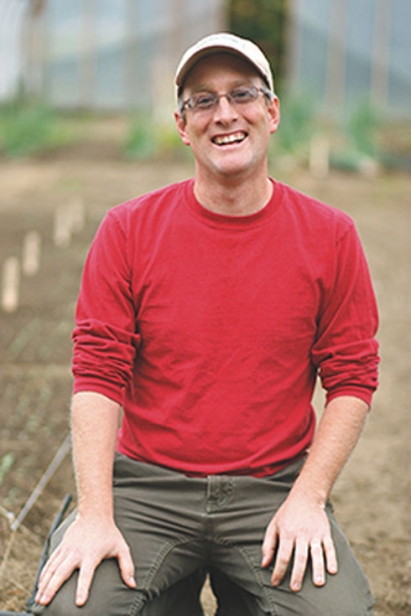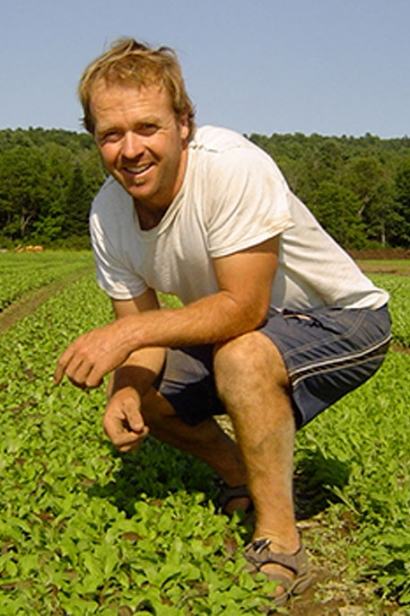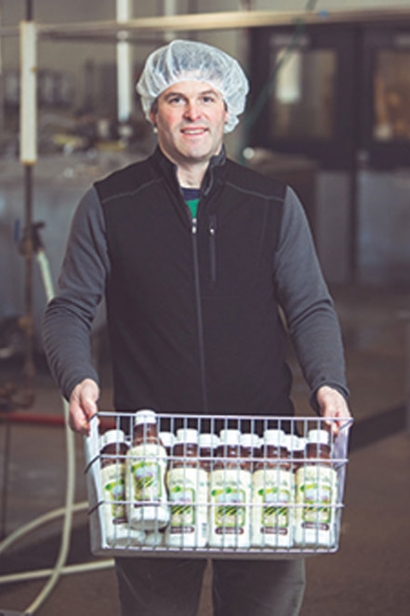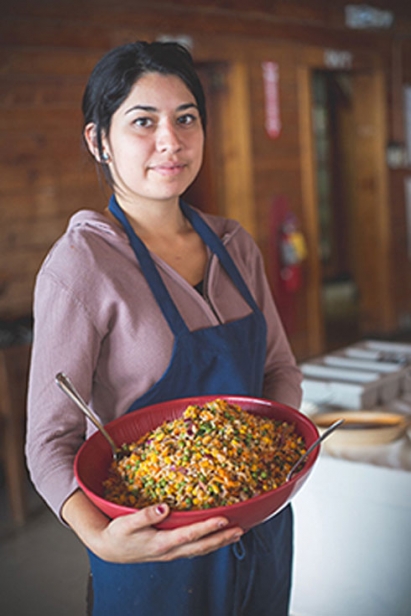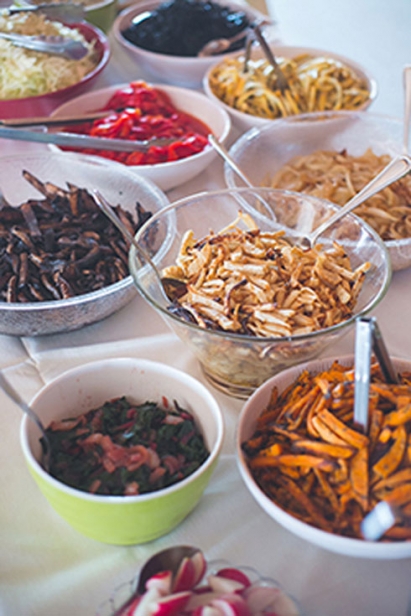Sterling College Joins Hardwick's Blossoming as an Ag Hub
The Town Saved by Food
When Matthew Derr became president of Sterling College in Craftsbury Common just about two years ago, he was determined to close the gap between town and gown.
The town, Hardwick—once called “Little Chicago” because of its seedy bars and porno movies—is now, thanks to a small group of agricultural entrepreneurs and artisans, a thriving agricultural center and the regional hub for eight smaller towns, including Craftsbury, Greensboro and Wolcott. No longer “Little Chicago,” it is best known today as “the town saved by food.”
And, as it is turning out, the town is lucky to have this particular tiny college of 120 students in its midst. Sterling is best known for offering a bachelor’s degree in sustainable agriculture, a program begun the 1970s, one of the oldest programs in the country. This year it added a degree in sustainable food systems.
Many colleges have farms but Sterling College is a farm. The classrooms are not just in buildings with desks and chairs; they are in barns and fields. Even the road that runs in front of the campus is where students learn how to work a team of draft horses. The college grows 20% of its own food, including pigs and rabbits, chickens and turkeys.
In the last year several of the people responsible for the revitalization of Hardwick began joining forces with the college and now they and the students are reaping the benefits. The leaders are Mateo Kehler, who with his brother, Andy, owns Jasper Hill Farm and Cellars in Greensboro; Tom Stearns of High Mowing Organic Seeds Company in Wolcott; Pete Johnson of Pete’s Greens in Craftsbury; and Andrew Meyer of Vermont Natural Coatings and Vermont Soy in Hardwick.
“For the college to have a local relationship to food systems and these people is an enormous advantage,” said Derr. “These are people who share our values, care about the environment and community, and the quality of what they are doing is at a level that is quite advanced,” said Derr. “This is the model to secure a local food system that works, and at the same time take care of people in need. We are all aware that it’s the energy and presence of these four people that makes this a vibrant place to live.”
From the beginning these men have worked together—sharing capital along with ideas and equipment and welcoming newcomers to their monthly meetings. They remain fast friends. So when Derr indicated an interest in being part of the vision, Sterling was quickly welcomed, after years of minimal contact.
In January Jasper Hill led the first of its three two-week courses in cheese making for students at Sterling and for outsiders. “Jasper Hill is interested in securing trained and talented new employees,” said Derr, “and sees the college as a way for business to grow. Well regarded in the world of artisanal cheese, they can attract the most highly qualified cheese makers around the world, something Sterling could not do on its own.”
In the summer the college will offer the course twice more, along with courses in charcuterie, fermentation and food writing.
Last year was a banner year for Jasper Hill, which sold its first cheese in 2003. Then it was stored in the basement of the house where Mateo Kehler lives with his family. Today there are cheese caves built into the hillside. Sales at Jasper Hill reached almost $8 million last year and Winnimere, the company’s famous washed-rind raw milk cheese, won best in show at the American Cheese Society’s annual meeting.
The company is in the process of creating the 21st century agricultural version of a car in every garage: cows on every significant acreage surrounding the center of Greensboro. The Kehler brothers want to rent the land from the owners and put cows on it, using the milk in a partnership with young people while helping them learn to make cheese.
Tom Stearns, who founded High Mowing Organic Seeds Company in 1996, is famous as the source of most of the seeds in Michelle Obama’s White House kitchen garden. Stearns is a trustee at Sterling. He and Derr are discussing similar two-week courses on seed growing with the possibility of placing some of the test fields at the college. A number of Sterling alumni already work for High Mowing.
“What really makes us different from other seed companies,” said Stearns, “is not just that we are organic but that we grow our own seed, so we oversee the genetics.” In the last five years his sales have gone from $1 million to $5 million. Every year High Mowing gleans 20,000 pounds of food that goes to the local food bank. In April, Stearns started selling its sprouting kits of organic, non-GMO seeds to Whole Foods.
Last year, Stearns and Andrew Meyer purchased a former inn across the road from Sterling and are leasing it back to the college for desperately needed dorm space to keep up with a jump in enrollment.
Meyer has offered Sterling students an opportunity to explore career interests by working with his company Vermont Soy, and he sees many other possibilities to connect the students who will end up in leadership positions in the Hardwick area.
Vermont Soy, which Meyer started in 2007, uses local soybeans to make organic soy milk and tofu. The company also makes soy rice pudding for Soyummi Foods, a Canadian company that has moved its factory to Hardwick.
In 2008 Meyer began making a wood finish based on whey that is much safer environmentally than the traditional polyurethane coating: it is now sold in 365 stores nationwide. The whey is a by-product of the cheese made at Jasper Hill and elsewhere.
Sterling students have always had some connection with Pete’s Greens, just down the road from the college, but this year Johnson found his two recent Sterling graduates to be so superior that he wrote a note to Derr describing them as “stars.”
Like his fellow entrepreneurs, Johnson began really small: ¼ acre of his parents’ land in 1997, where he just grew greens. Today he has 80 acres in vegetables and grows 45 organic crops, which he sells from his Craftsbury farm stand on the honor system, in a little wooden building whose pitched roof sprouts greenery all season long. He also sells through his CSA with 600 customers year round and 20 pickup locations. Pete’s Greens has a stand at the Montpelier farmers’ market. The CSA and the farm stand also sell products from other local farmers: beef, cheese, milk and ice cream, even flour. Now Johnson is concentrating on developing new products and markets. He is selling fresh cut-up root vegetables to stores and schools. With foundation money he is helping schools purchase these vegetables and educate children to eat them.
Through the efforts of these four men, Hardwick became home to the Food Venture Center, where beginning farmers and nascent artisans can rent production space to make value-added products. With advice from the Center’s experts, budding entrepreneurs learn how to make a profit. The Food Venture Center helps small farmers who develop locally and sustainably raised products, often organic, to make a living without a second job off the farm.
In fact, the Hardwick name on processed food has become a mark of distinction. Ask Doehne “Deano” Duckworth, who moved his production of Deano’s Jalapeño Chips to Hardwick three years ago from Stowe, where he’d outgrown his production facilities. “I definitely targeted Hardwick because of the amount of food business and support,” he said.
So little Hardwick, in the Northeast Kingdom, has become a consequential food hub that has increased land values, filled empty buildings with tenants, put people to work and added significant value to an education at Sterling.
Sterling has raised its profile, too, worthy of a visit from an icon of sustainable and organic food: Alice Waters. She came to see the college and Hardwick in April.


